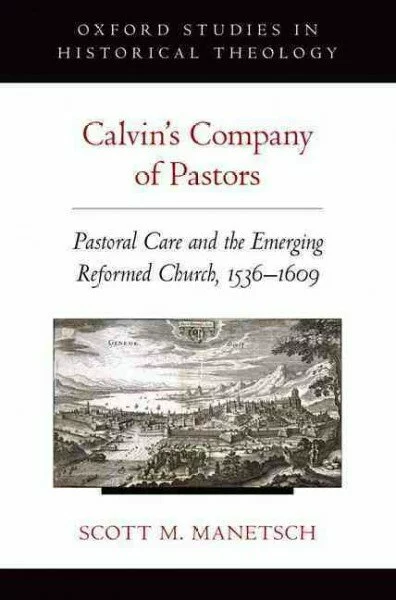Manetsch’s book stands out for the way it interweaves theological and prescriptive sources with archival material describing the careers of Geneva’s pastors and their interactions with the city’s inhabitants. Most studies of Calvin and Geneva focus on either the reformer’s theology or its practical consequences, as seen especially in the consistory records, but Manetsch is equally at home with both theology and praxis. The result is a rare and valuable balance and depth of
perspective. Calvin’s Company of Pastors not only contributes to our growing knowledge of Protestant pastors as a social group but also provides a detailed study of longterm confessional formation in the century after the Reformation.
Amy Nelson Burnett
Paula and D.B. Varner University Professor of History, University of Nebraska-Lincoln
American Historical Review 119, no 2 (2014): 588.
The book exhibits the best of academic research and scholarship coupled with insightful application for modern-day pastors. It is historically accurate, detailed and informative; but the wealth of data never intrudes into the narrative. Manetsch has performed a masterful job of compiling extensive information (a large proportion that appears seemingly dry and irrelevant) into an engaging and vivid portrait of Geneva’s Reformed ministers.
Jonathan Gibson
Associate Professor of Old Testament, Westminster Theological Seminary
Themelios 41, no 1 (2016): 143-144.
Overall, Mantesch’s book strikes a good balance of both the theological and pastoral ideas present in the writing and thought of these Genevan Reformers and the fundamental pastoral practices at play among them. The book is well-grounded in the practical realities of Calvin’s Geneva yet takes the theological thought of the time equally seriously. This methodological approach is refreshing, especially combined with the enormous depth of original research evidenced throughout the entirety of the book. Manetsch has opened up a fascinating pastoral world and culture. The book’s crisp writing invites a charitable but sober understanding of Calvin’s Geneva. Manetch also succeeds at tracking some notable changes between the Calvin and post-Calvin phases of Geneva—though perhaps he could have included aspects of this in the conclusion in a way that presented these findings more succinctly for the reader. I heartily recommend this book for a wide audience of historians, theologians, and pastors alike, who I believe will benefit from fresh scholarship and a wealth of pastoral experiences—the wisdom, failures, and triumphs—of Geneva’s Reformed ministers.
Jeb Ralston
PhD Student, Trinity Evangelical Divinity School
Presbyterion 48, no 2 (2022): 169-170.
Throughout this study, Manetsch works to ground our understanding of early modem clergy in an acknowledgement of their commitment to their religious
vocation. In this, he contributes to recent scholarly discussions seeking a rebalance between the highly confessionalized histories of the Reformation
from a century ago, and the scholarship of the 1980s and 1990s that delved into archival sources to shed light on the broader economic, social, political,
and familial factors involved in Reformation developments but tended sometimes to underplay the role of religious faith. In his effort to re-center
attention onto the pastors’ religious commitment, however, Manetsch may be overstating the case when he suggests that the confessionalization thesis of
Heinz Schilling and Wolfgang Reinhard necessarily reduced clergy to “mere ‘agents of the state’” (7) and, most importantly, that this view is largely
unchallenged in current scholarship. Nonetheless, this book contributes significantly to current efforts to better incorporate all the relevant factors
into our understanding of the Reformation. Manetsch’s impressive utilization of such a wide range of sources allows the reader access to a complex and
more complete picture of the interplay between theological ideas and pastoral practices in Reformation-era Geneva.
Karen E. Spierling
John and Heath Faraci Endowed Professor for History, Global Commerce, and Financial Economics, Denison University
Church History 83, no 2 (2014): 465-467.
Church history enthusiasts will be delighted at the richness of historical detail provided in this academic volume. But I also think pastors, counselors, and others
interested in thoughtful ministry will find the book full ofilluminating insights. Two specific themes speak pointedly to the readers ofthis journal. The book explores the vital role the pastor plays in the life ofthe local church, and the equally necessary role offocused personal ministry.... Calvins Company of Pastors gives us a rich precedent for how persuasive public ministry and penetrating personal ministry co-labor in ministry of the Word. Though this book is an academic work, its value extends to the practice of ministry and counseling. There is much wisdom to be gleaned from these pastors, their lives together, and their pastoral work.
Chris Carter
Executive Director, Logos Biblical Counseling
Journal of Biblical Counseling 27, no 2 (2013): 93-96.
Near the brightest lamps the lesser lights glow dimmer, but the lesser lights are also needed to illuminate the whole house. When we study history as the story of impressive actors, we easily forget that the great men and women of the past would not have been who they were without the people around them.
In this contribution to the history of the Reformed church of Geneva, Scott M. Manetsch gives an account of the Company of Pastors during the first seventy years of the Genevan Reformation. In this period (from 1536-1609) there were three leading pastors: the founding father John Calvin, his loyal and trusted heir Theodore de Bèze, and Simon Goulart who guided the church of Geneva into the new century. What, however, do we know about the other 135 pastors who served as ministers of the Word of God in and around Geneva during these years? What can we discover about those to whom they ministered in the Genevan church? In this scholarly but readable book, Manetsch brings the church and community of the city of Geneva to life by using available archival materials and the
results of recent scholarship.
Machiel A. van den Berg
Calvin Theological Journal 49, no 2 (2014): 345-347.


